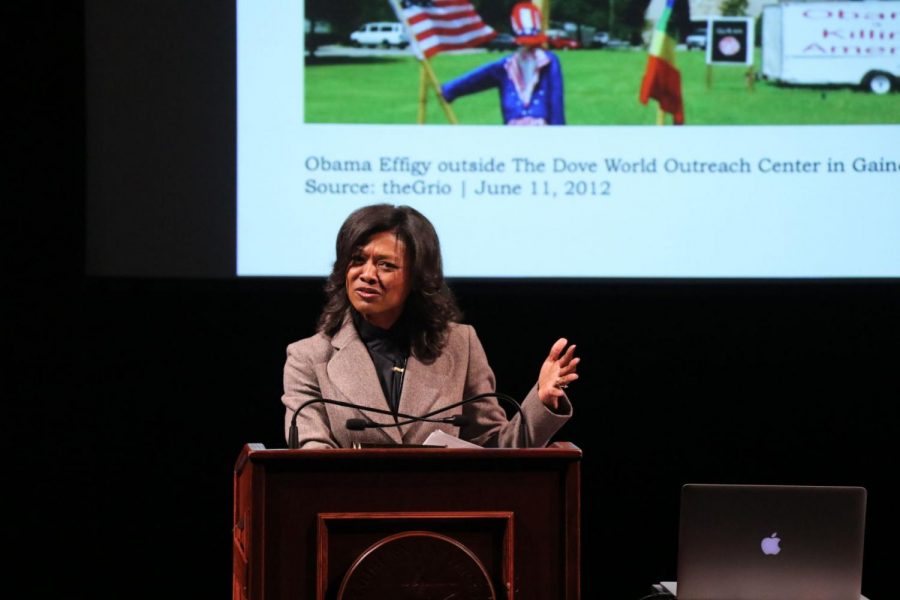Koritha Mitchell speaks on homemade citizenship
March 1, 2020
The lecture, “Homemade Citizenship: All But Inviting Injury,” suggests that African Americans cannot count on being treated as citizens in the U.S. It’s part of the Spring 2020 WUmester topic of citizenship and suffrage.
The 2020 Lincoln Harman Lecture, “Homemade Citizenship: All But Inviting Injury,” was held at 7 p.m. Feb. 27 in the Washburn Theater in Garvey Fine Arts Building. The talk was presented by Koritha Mitchell, associate professor at Ohio State University.
The talk started with the welcome speech of Washburn University President Jerry Farley. After that, Bruce Mactavish, a history professor, introduced Koritha Mitchell.
Mitchell specializes in African American literature, racial violence throughout U.S. literature and contemporary culture, and black drama and performance.
The event was open to the public. Washburn staff, students and many people in the Topeka community attended the talk.
Aidaly Heredia-Wilson is a senior, forensic investigation major, at Washburn University.
“It was interesting to learn another person’s point of view about how society is, when it comes to different races and how they treat certain races in certain situations,” said Heredia-Wilson.
Nazim Phillips is a student from Topeka High School. He attended the talk with his friends.
“Being black or minority, you have to kind of elevate our behavior in order to be accepted in society,” said Phillips.
Many African Americans have been successful in their field of study, but they are not treated safely and respectfully in some situations. They seem to cling to all that purportedly makes one an ideal citizen. It includes the heteronormative nuclear family and its traditional household.
“I want students of color to understand that the things that they’re experiencing, they are right about how valid it is,” said Mitchell.
Mitchell studied the question of what this pattern of investing against the odds reveals about African American Culture. The answer is homemade citizenship.
Mitchell talked about black soldiers and nurses who have served in wars and the Ivy League-educated constitutional lawyer who was elected to the office of the President of the United States, only to face demands that he “show his papers,” and how President Barack Obama faced many challenges in the election and during his terms in office.
“I want to be more aware of how I act, as well as what I can do to make a change in the world,” said Phillips.
At the end of the speech, Mitchell had conversations with the audience and answered their questions.
“The entire talk is very informative about the fact that we need to label the majority,” said Heredia-Wilson. “Make sure that we label the norm to show that’s not the norm that’s what the society is labeled as the norm.”
Mitchell’s talk inspired the audience in many ways. She shared her study and opinion as a gift to the audience. She hopes to empower them in their life. After the talk, some people had the chance to talk to her and make connections.
Mitchell is the author of the award-winning book “Living With Lynching: African American Lynching Plays, Performance and Citizenship, 1890 – 1930.” Her forthcoming work is “From Slave Cabins to the White House: Homemade Citizenship in African American Culture” in summer 2020. It’s inspired by the recognition that African Americans continue to invest in traditional domesticity. For more information, connect with Mitchell on Twitter @ProfKori.
“It feels to me, that can be empowering, because that’s what’s been empowering for me, for me to know that I’m not imagining it,” said Mitchell. “This is foul, and I’m not wrong for thinking it’s foul.”
Edited by Adam White, Jason Morrison, Diana Martinez-Ponce



